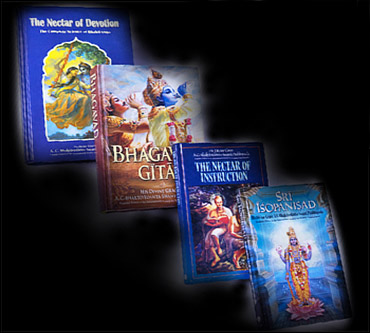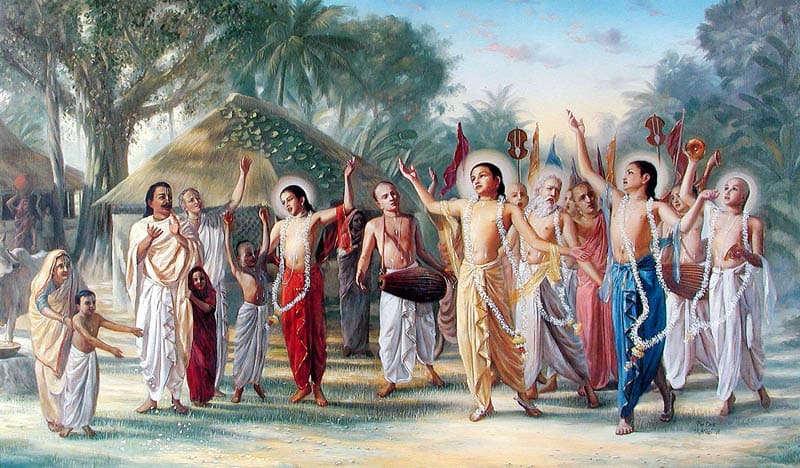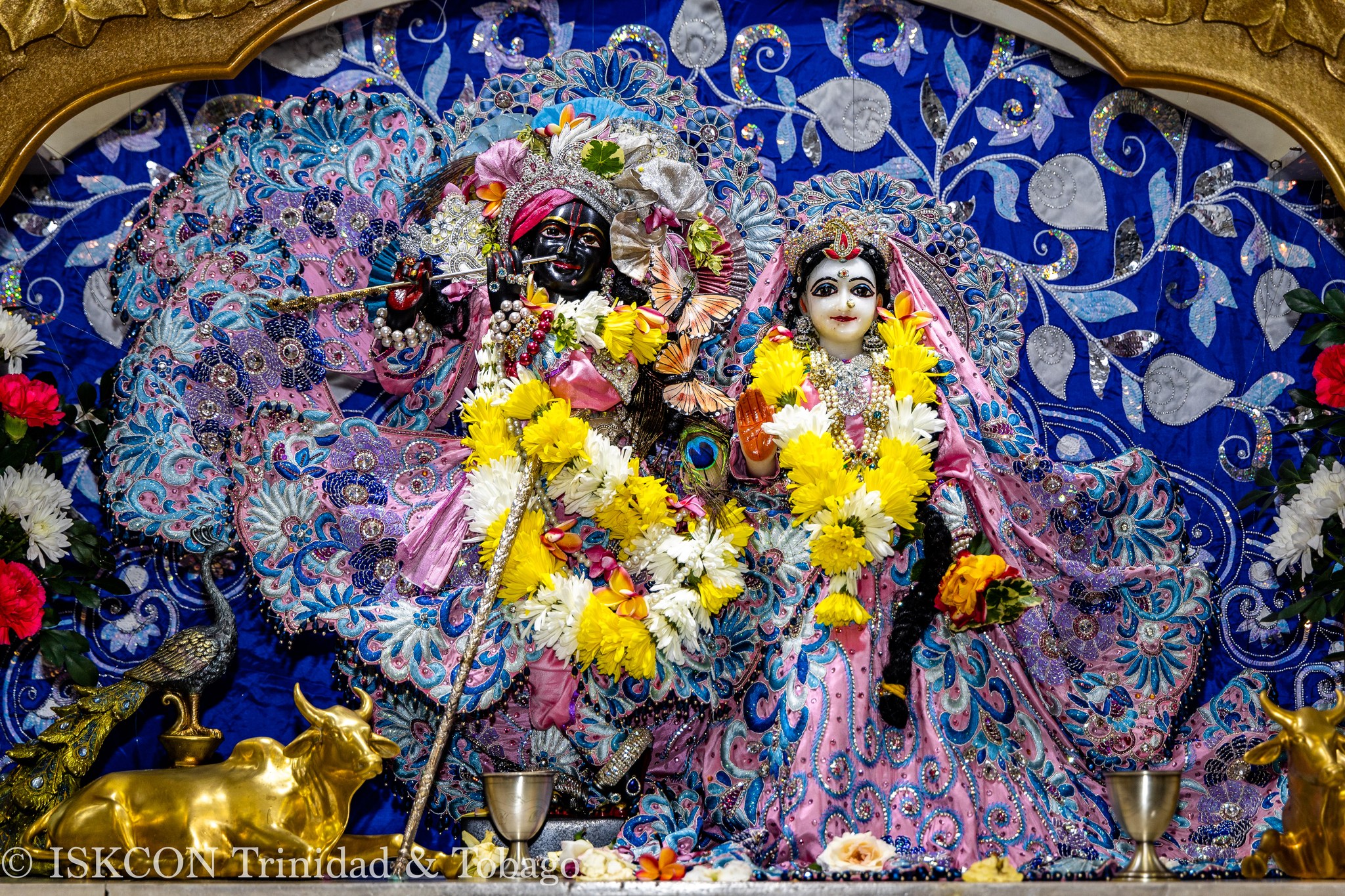
ISKCON Trinidad and Tobago
Dedicated to the Founder-Acarya His Divine Grace A.C. Bhaktivedanta Swami Prabhupada
What is ISKCON?
Discover the International Society for Krishna Consciousness
The International Society for Krishna Consciousness (ISKCON), otherwise known as the Hare Krishna movement, includes five hundred major centers, temples and rural communities, nearly one hundred affiliated vegetarian restaurants, thousands of namahattas or local meeting groups, a wide variety of community projects, and millions of congregational members worldwide.
ISKCON belongs to the Gaudiya-Vaishnava sampradāya, a monotheistic tradition within the Vedic culture. Philosophically it is based on the sacred Sanskrit texts Bhagavad-gītā and the Bhagavat Purana, which teach that the ultimate goal for all living beings is to reawaken their love for God, or Lord Krishna, the "all-attractive one".
Ancient Wisdom
Timeless teachings from the Bhagavad-gītā and Bhagavat Purana guide our spiritual journey
Global Unity
A worldwide family of millions practicing Krishna consciousness across 500+ centers
Bhakti Yoga
The sublime path of devotional service that awakens our eternal love for Krishna
Cultural Bridge
Connecting ancient Vedic wisdom with modern life through practical spirituality
Ready to Learn More?
Discover the profound teachings and vibrant ISKCON community
Our Temples
Come to one of our centers and revive your dormant love of God.
Sri Sri Radha Gopinatha Mandir
LP #60 Edinburgh Road, Longdenville, Trinidad and Tobago
Sri Sri Nitai Gaurachandra Mandir
Orion Drive, Debe
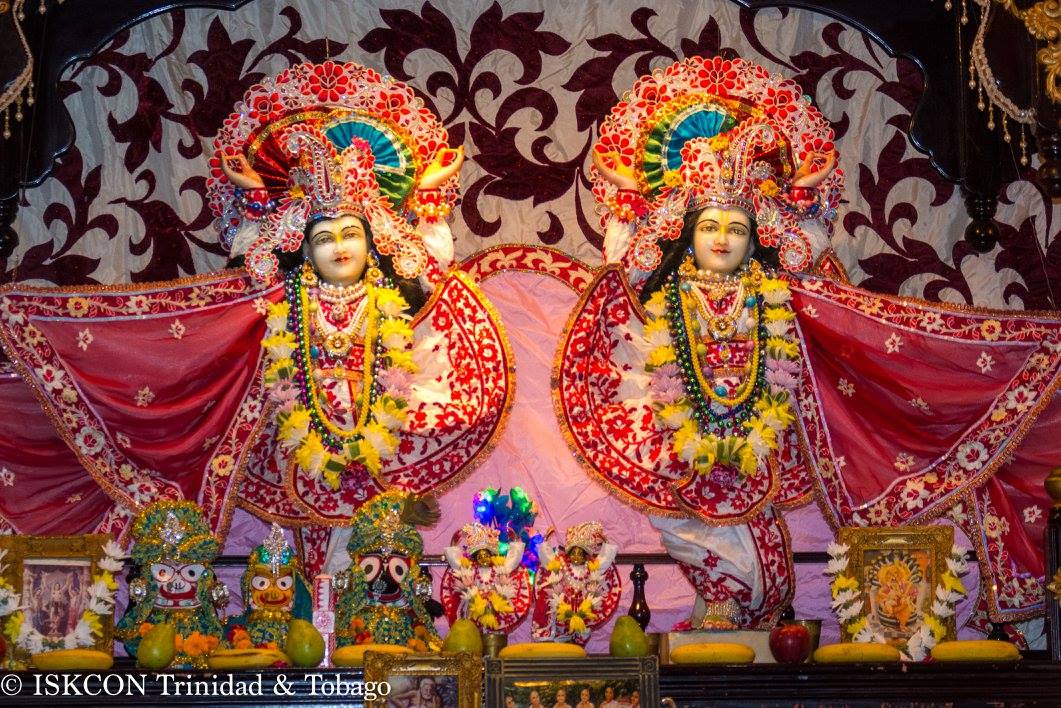
Our South Temple, located in the heart of Debe, is a vibrant center for the local devotee community, offering regular programs and festivals.
Sunday Love Feast
5:00 PM - 6:30 PM
Temple President - Adi-Keshava Dasa
(868) 787-3348
Madhuvan Farm Temple
LP 351 Cumuto Main Road, Coryal
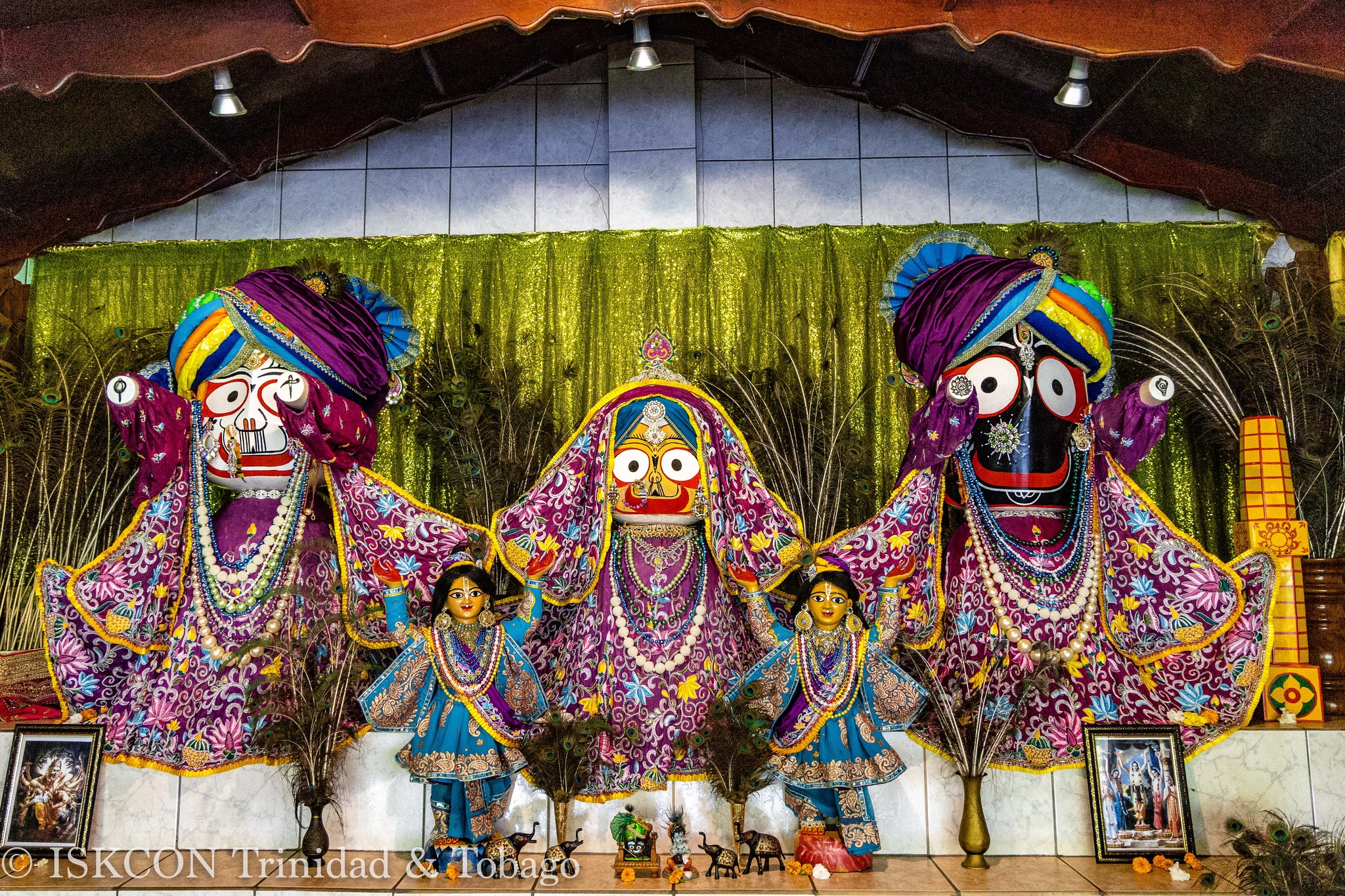
The serene Madhuvan Farm Temple is nestled in the heart of the lush Cumuto countryside, offering a peaceful retreat for devotees to connect with the divine.
Sunday Love Feast
5:00 PM - 6:30 PM
Santa Vigraha Dasa
(868) 299-5957
Sri Sri Nitai Gauranga Mandir
Eastern Main Road, Garden Village, Arouca
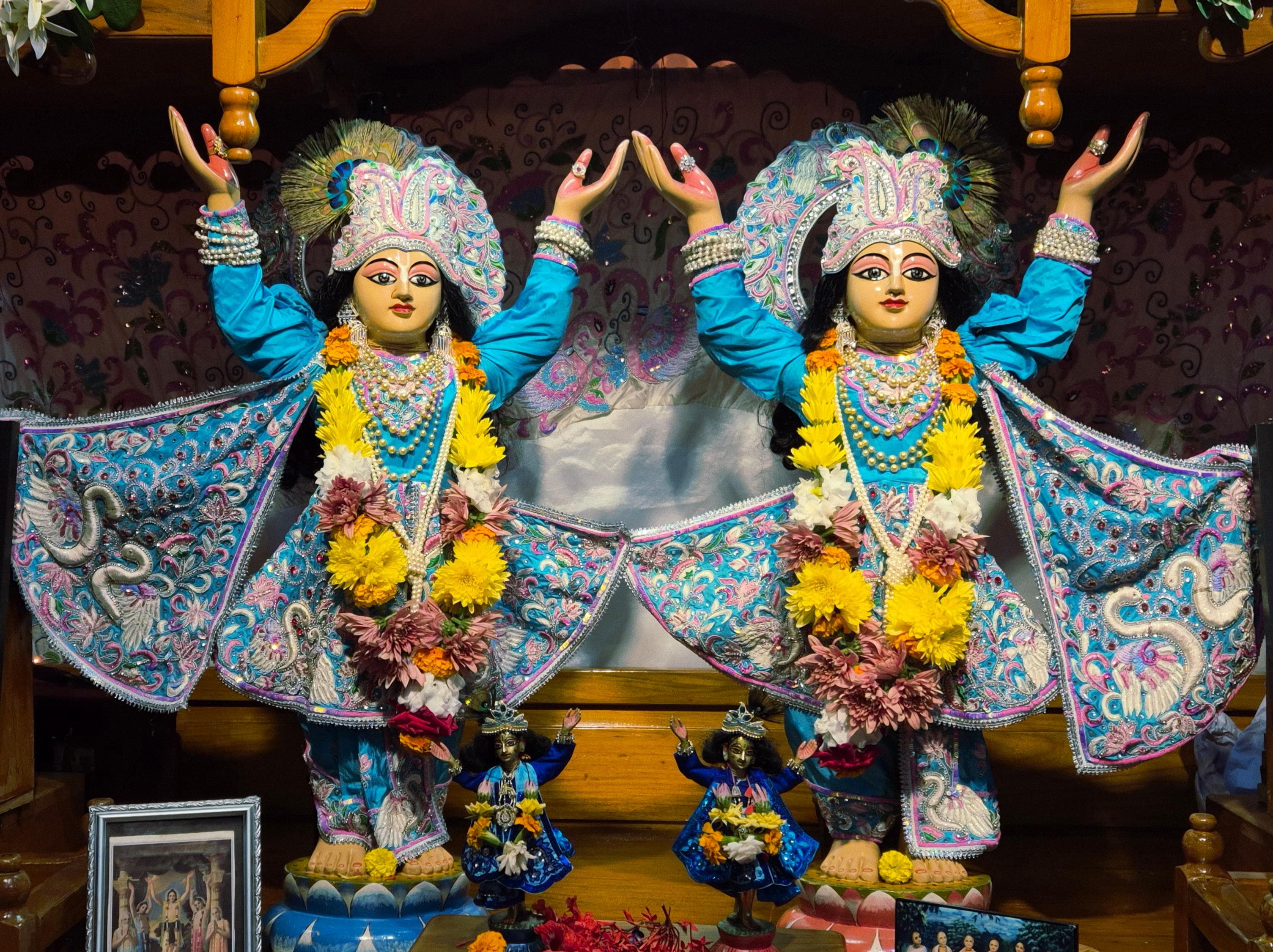
Our Arouca center is a vibrant hub for the local devotee community, offering regular programs and festivals.
Sunday Love Feast
5:00 PM - 6:30 PM
Contact - Dhanaysaree Mataji
(868) 726-0640
Upcoming Festivals and Events
Join our spiritual community for festivals, classes, and special programs
View All EventsOur Local Activities
Discover the various ways ISKCON Trinidad & Tobago serves our local community through education, culture, spiritual practice, and compassionate outreach programs.
Frequently Asked Questions
Who is Lord Krishna?
What is reincarnation and what happens at death?
The word "reincarnate" derives from the root "carna" which means "flesh". Reincarnate therefore means to enter into the flesh again. The Vedic texts explain that the spirit soul is eternal and it never dies. In the natural course of life the body grows from a baby to youth to boyhood, middle age, then old age and death, and then transmigrates into another body at death. Your destination depends upon your thoughts at death, and what we think of at the time of death depends on what we have been absorbed in for most of our lives.
Are the Deities idols?
One of the most unique aspects of Vaishnavism is the form of Deity (murti). The Vedic texts maintain a sharp distinction between idols and Deities. The Deity is not a figment of imagination of the artist. The ancient texts called Shilpa-shastras give exact prescriptions for the fashioning of deities. There are specifications for the proper stance of the Deities, hand gestures, bodily proportions etc. The artists called shilpins enter into deep meditation and carve deity forms in accordance to scriptural canon. After this, elaborate ceremony is performed where the Lord is asked "to imbue the Deity with His divine presence". At this point, Deity is ready to be worshipped.
Why is there suffering?
The answer is Karma. Western science and philosophy explain that the law of causality governs all actions and events in the universe. Actions and events have corresponding reactions on the material platform. The Vedic texts call this principle of action and reaction "karma". The spirit soul, which is entrapped in the material nature, acts in particular ways which can cause it either further bondage or liberation from the laws of nature. An individual's actions bring about his or her transmigration from one body to another. One cannot become free from karma simply by refraining from action. One has to learn the art of working without accruing karma, which is the process of bhakti yoga, or devotion to God.
Why do we chant?
Chanting is a spiritual practice that has a place in practically all religious traditions, although the method of practice may differ. It is a transcendental sound vibration that connects with the spirit soul; the soul cannot be Muslim, Hindu, Christian or Jew; the soul is simply what it is – pure spirit. According to Vaishnava tradition (which include devotees of Krishna), these spiritual sound vibrations especially the Hare Krishna Maha mantra - connects with who you really are (the soul) and revives our dormant spiritual consciousness. It is like nourishment for inner-self. The mantra is not a sectarian chant belonging to a particular religion. It is a chant of names of God and can be chanted by anyone.
What is the yellow marking on the forehead?
The markings are called "tilak" and applied with sacred clay. Although the forehead marking is the most conspicuous, the devotees of Krishna mark their bodies at 13 central energy centers, reciting various names of the Lord while applying to each spot. This meditation is designed to promote the awareness that body is a temple of God.
Why be vegetarian?
We believe the art of cooking is a sacred experience, based on principles of compassion, non-violence and balanced living. Devotees abstain from eating meat, fish and eggs. We believe being vegetarian sustains the environment. The meat industry contributes largely to deforestation, desertification, water pollution, water shortages, air pollution, and soil erosion. Half of the Amazon rain forests have been cleared for cattle ranching. All the soybean and grain fed to US livestock in a year could feed 1.3 billion people. The only practical way to respect and be affectionate to all living entities is when we believe Lord as the Supreme father. The Bhagavad Gita further declares that one who lovingly offers his food to God according to scriptural guidelines is freed from sinful reactions.

